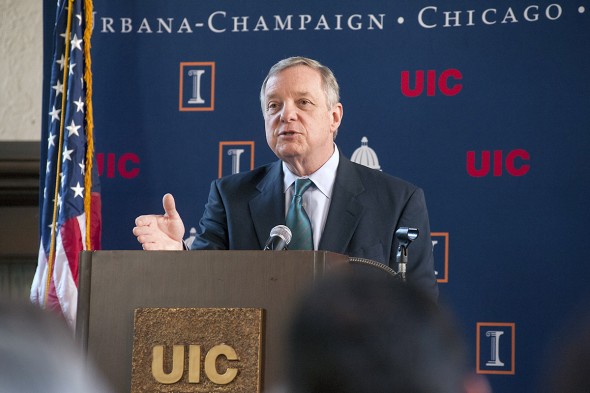Durbin calls for increased federal funding for health research

U.S. Sen. Dick Durbin talks about the American Cures Act at the College of Medicine Monday. Photo: Roberta-Dupuis Devlin/UIC Photo Services
U.S. Sen. Dick Durbin, on campus Monday to promote the American Cures Act, cited medical marvels and groundbreaking research.
At UIC, “gene-based therapy may lead to the end of the recurrence of lung cancer,” he noted in a talk at the College of Medicine.
Durbin spoke of Melissa Stockwell, a former Army officer who in 2004 became the first female American soldier to lose a limb — her left leg above the knee — in combat. Now a prosthetist at UI Health, in 2008 she became the first wounded Iraq War veteran to make the U.S. Paralympic Swim Team.
Stockwell stood to applause as the Illinois senator finished telling her story.
Durbin also talked about Janet Rowley, the University of Chicago researcher who in 1972 noticed that a bit of material on two chromosomes was in the wrong place. This “genetic translocation” was what she called her “Oh wow!” moment and led to the discovery that genetic mutations cause cancer and not, as thought, the other way around.
In pushing for passage of the American Cures Act, which he introduced two weeks ago, Durbin said, “We’re addressing an issue that is critical to our life here on Earth.”
The American Cures Act would increase funding for the National Institutes of Health, Centers for Disease Control and Prevention, Department of Defense Health Program and the Veterans Medical and Prosthetics Research Program. In the first year, the agencies would receive an additional $1.8 billion. The amount would increase each year for 10 years, ultimately totaling $150 billion.
“People ask, ‘Doctor, is there a cure?’ That’s what this legislation is about,” Durbin said.
In the last two centuries, government-supported research has helped split the atom, defeat polio, conquer space and map the human genome, he said.
America’s massive outlays for medical research have paid off, Durbin said.
He offered two examples: each 1 percent drop in cancer deaths saves half a trillion dollars in health care costs, and the $14.5 billion Human Genome Project has triggered a trillion dollars in economic activity.
Durbin pointed out that former Illinois congressman John Porter, a Republican, and two Democratic U.S. senators, the late Arlen Specter and Tom Harkin, led a move that doubled the funding of the National Institutes of Health in 10 years.
But all is not rosy, he said. Thirty-five years ago medical funding was the equivalent of 1.3 percent of the Gross Domestic Product; today it is .8 percent, a 40 percent decline.
Medical spending is a form of discretional outlay, putting it in competition with Head Start and other programs. Medical research spending in China, Durbin added, has risen by 12 to 20 percent over the last eight years, and is now greater than in this country.
The legislation “ought to be a bipartisan effort,” Durbin said.
“We want to make sure that future generations look back and say, ‘They did it.’”
